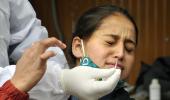'There are no drugs to be given in the first week, if you have been hospitalised.'
'If you're getting any drug, that drug is likely to be unnecessary.'
'Or the hospitalisation is unnecessary.'
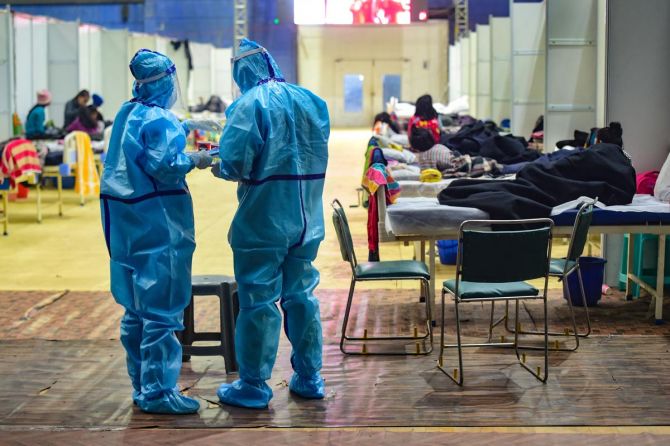
If you, your spouse, your siblings, your parents or your in-laws contract COVID-19, there is a small chance someone will need to be hospitalised.
With double vaccination and the advent of Omicron, though Delta still lurks, that chance has reduced considerably.
Dr Lancelot Pinto, a respiratory disease specialist with a degree in epidemiology attached to the P D Hinduja Hospital and Research Centre, Mahim, north central Mumbai, is a strong, vigorous advocate and social media voice for far more conservative medicine practices and treatment protocols during these unusual, trying COVID-19 times.
Dr Pinto offers a set of must-read common-sense guidelines on how to negotiate or navigate a hospital situation and emphatically contends why you or your family should avoid hospital admission if possible.
Hospital admission is not necessary for most COVID-19 cases
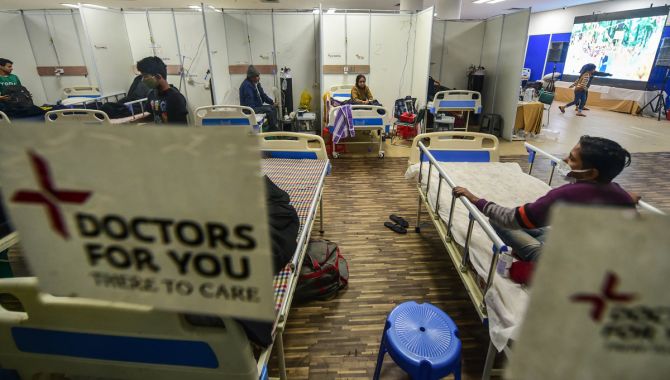
Once someone ill with COVID-19 is admitted, his care is in the hands of the hospital and, in sometimes chaotic COVID-19 situations, it might be difficult to have any power over the narrative of treatment for the patient. Or for him or his relatives to have a say in how the treatment evolves.
So, keeping that in mind, according to Dr Pinto, for the bulk of COVID-19 cases (the Omicron variant included), admission to a hospital is not required.
"As a broad rule, I don't think anybody should be admitted for monitoring.
"If you look at it in the context of what drugs we have available for COVID-19 -- drugs which have been scientifically proven and that are in India, like Molnupiravir; the new Paxlovid is not available -- in the first week there is pretty much nothing that has been proven to work that can be given.
"In the first week of COVID-19, if everyone's playing by the book, even if a person is admitted, all doctors are supposed to do is observe, because doctors really don't have any drugs which can influence the course of the disease (in the first week). Therefore, I would suggest that you might as well 'observe' at home rather than 'observe' in a hospital.
"Let's put it this way, if you do get admitted in the first week, the likelihood that you will get unnecessary drugs in the hospital is reasonably high. There are no drugs to be given. If you're getting any drug, that drug is likely to be unnecessary."
Why do unnecessary hospital admissions occur?
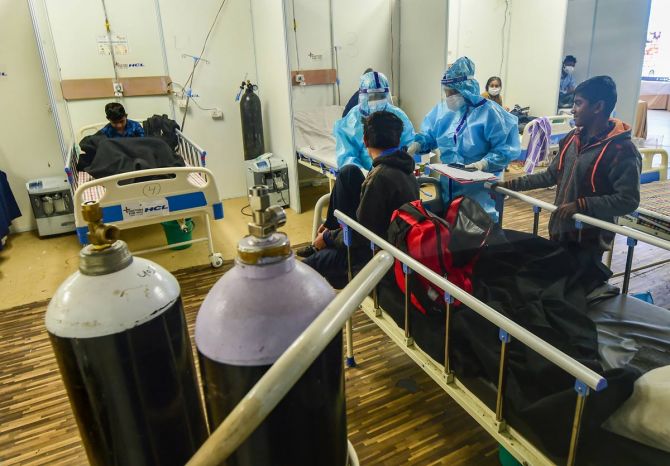
They occur because:
1. Doctors or hospitals might push for it unnecessarily.
Like for instance, the administration of the COVID-19-fighting cocktail Regeneron (approved last May) does not require hospital admission, but some hospitals may stipulate that it does (please see the Regeneron box below)
2. Anxious relatives of patients feel their relative is safer in the hospital, when, truth be told, they are often better off at home.
Says Dr Pinto: "It's not always the doctor, it's sometimes the patient/patient's relatives who are really pushing hard for an admission as well.
"Very often you have a situation in which there are sons and daughters, who are say in their 40s, and their parents are in their 60s or 70s, and they tell you: 'Listen, we absolutely don't want to take a chance. Let's admit them. Observe them for a week or so. If they are okay, fine, discharge them'."
Another reason why relatives insist on admission, for someone who is ill with COVID-19, Dr Pinto has discovered, is because they are unable to manage the person at home. They either don't have enough room to isolate or the means to give care or the caregiver they had is no longer ready to care for the person. knowing he has COVID-19.
"Sometimes people get admitted, just because they know that the nursing care is going to be good. And they know, they're going to have somebody watching over them 24/7."
The solution, feels Dr Pinto, would be a hospice or a place that is halfway between a home and a hospital and not many of those kinds of places exist in India.
Mumbai -- and many other cities -- does offer this kind of support via its Maharashtra-government run COVID-19 care centres.
Dr Pinto: "Unfortunately, people look down on the tents as being a more low SES (socioeconomic status) kind of facility, where the poorer people go, like a municipal kind of facility. People, who want to pay out of pocket, and want something they believe/feel is better for their loved ones, will usually push for a (private) hospital instead."
3. Unnecessary admissions also occur because of the scarcity of hospital beds, like it happened during the first and second wave. For the sake of abundant caution, a patient, who might be faring reasonably well at home, but could need hospital/ICU care a little bit down the road, when beds might be scarce, may be admitted early.
Dr Pinto: "One of the driving questions as to whether or not to get admitted is the actual bed availability status. When I tele-consult, I'm often telling people: 'Listen, you are high risk. But beds are easily available at the moment. So even if things don't turn out right, we can get you in the hospital at the drop of a hat'. That's a very useful, reassuring fact, to have on your side.
"On the other hand, if you have a situation where beds are not available, your threshold for hospitalisation gets a little lower, because you don't want to risk somebody being in a situation where things deteriorate at home and you don't have a bed available at that particular point.
"That (bed shortage) becomes a major governing factor in terms of whether or not to hospitalise. One of the ways in which we reach the point where beds are not available in India, is because we over-admit people who don't need hospitalisation initially.
Dr Pinto's four-point checklist to determine if you need hospital admission or not:
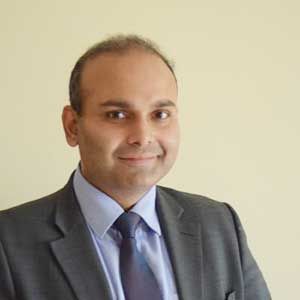 IMAGE: Dr Lancelot M Pinto. Photograph: Kind courtesy Dr Lancelot M Pinto
IMAGE: Dr Lancelot M Pinto. Photograph: Kind courtesy Dr Lancelot M Pinto"I have a checklist of four -- I tell people that if one of these four things happen, that's when you should consider getting admitted.
1. "An oximeter reading of 95 is our threshold. Again, 95 is not when you start oxygen, but a margin of safety kind of threshold. But if it goes below 95, and you start getting a bed, by the time you get the bed, even if you're progressively deteriorating (it will probably touch 90) you're still in a relatively safe zone."
2. "If the fever doesn't settle by about seven or eight days. I don't tell them to get hospitalised, but I tell them: 'We might have to work you up more. We might have to get a few blood tests done. We might have to see what's happening'."
3. "If you're getting breathless at any point of time."
4. "Or if you're getting a really bad cough and the cough is worsening, because that kind of, again, reflects a lung or lower respiratory involvement.
These are kind of four red flags that I tell all my patients, to look out for. Of course, of these four: The reason to get hospitalised immediately would be if the oxygen levels are dropping. The other three would mean that we might need another monitoring test and might need to see exactly what's happening*.
"But as a blanket rule, I don't tend to admit -- I wouldn't even say I don't tend to admit -- I would not admit anyone just for observation."
*Dr Pinto's four red flags system would apply slightly differently, he says, for the immunocompromised. "The question would always be there whether they mounted a response to the vaccines and what if the vaccines weren't effective at all. You would generally monitor them more closely." But he would not admit them for observation either.
About Regeneron
For the COVID-19 cocktail Regeneron, the turnaround time is three or four hours for the whole process and a patient can go back home, according to Dr Pinto. A patient comes in, receives the infusion, and is out.
"I do know -- I've heard this from my patients -- that there are hospitals that are saying that you need to be in an ICU for 24 hours when you get Regeneron. Then there are hospitals, which say that you have to be admitted at least overnight once you receive Regeneron. Clearly, somebody is exploiting the whole thing.
"By definition, you are not supposed to give the drug once a person has deteriorated already. It works only in the first seven days in early disease. That's a paradox right -- if a person needs to hospitalised to receive it, it's probably too late for the Regeneron."
Dr Pinto on how a doctor should lay out the facts for administering a drug:
In the kind of conversations that I have about Regeneron, I tell the person:'Given your profile, among 1,000 people like you, probably 10 of them would deteriorate. If you take the Regeneron cocktail those 10 would probably decrease to three. So, it's 10 in 1000, versus three in 1000. By taking Regeneron you are making a rare event, even rarer, but the event to begin with is quite rare.
'The flip side is that it costs Rs 120,000 (or whatever) -- that's the cost benefit versus economic ratio in front of you'.
"Some people will say: 'It's okay, we are ready to wait and see how things go'. Some people will say: 'No, money is not an issue at all, let's go ahead and give it right away'.
This is the problem with our healthcare. When you're paying out of pocket, not doing something is also associated with a lot of guilt. For not just a doctor, but for the relative as well, to take a choice for your loved one that you will not do something, because it's too expensive, is also a difficult choice.
"It's not a fair equation, when you have a doctor calling from a hospital saying:'This is a very expensive drug, but it might help your loved one. Do you want to receive it or not?' I don't know what the alternative is and if there is an alternative. But this is far from ideal."
Feature Presentation: Ashish Narsale/Rediff.com




